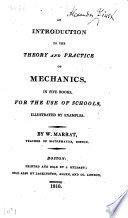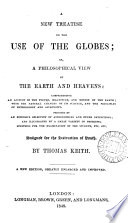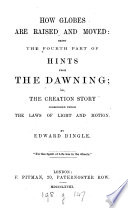 | William Marrat - Mechanics - 1810 - 512 pages
...matter, and is on that account ever proportional to the quantity of matter in the body. AXIOMS. 17. Every body continues in its state of rest, or uniform motion in a right line, until a change is effected by some external cause. 18. Any change effected in the quiescence... | |
 | Thomas Keith - 1821 - 408 pages
...it is called an uniform accelerative force. GENERAL LAWS OF MOTION. LAW I. " Every body perseveres in its state of rest, or uni"form motion in a straight line, unless it is compelled to " change that state by forces impressed thereon.' — Newton's Princip. Book... | |
 | Literature - 1907 - 848 pages
...electricity exhibits a quality akin to the "inertia" of matter, which tends to retain every material body in its) state of rest or uniform motion in a straight line except so far as it is compelled by forces to change that state. This at once raises for us the new question, May not the... | |
 | Christianity - 1882 - 662 pages
...emphatically recognized their existence. His words are : 'Every body perseveres in its state of rest, or of uniform motion in a straight line, except so far as it may be compelled ly force to change that state.'* * Sec 'Treatise on Natural Philosophy,' by Sir W. Thomson and Professor... | |
 | Thomas Keith - 1848 - 486 pages
...motion of bodies have been deduced : — GENERAL LAWS OP MOTION. LAW I. — " Every body perseveres in its state of rest, or uniform motion in a straight line, unless it is compelled to change that state by forces impressed thereon." — Newton's Princip. Book... | |
 | William Makepeace Thackeray - Electronic journals - 1907 - 872 pages
...electricity exhibits a quality akin to the ' inertia ' of matter, which tends to retain every material body in its state of rest or uniform motion in a straight line except so far as it is compelled by forces to change that state. This at once raises for ns the new question, May not the... | |
 | Aubrey William O. Saunders - 1861 - 162 pages
...exhausted, in the line of fire, agreeably to the first law of motion, by which every tody must persevere in its state of rest or uniform motion in a straight line, unless it be compelled to change that state by forces impressed upon it. Why cannot the bullet do this... | |
 | Edward Dingle - Creation - 1868 - 350 pages
...space, or non-corpuscular atoms of ether, by centrifugal force. He says, — " Every body perseveres in its state of rest, or uniform motion in a straight line, unless it is compelled to change that state by forces impressed thereon."* Now what force is to impress... | |
 | Encyclopedias and dictionaries - 1881 - 210 pages
...6,885— A "CUKVED BALL." 159 SOOTH WOOD ST., CHICAGO, Jan. 22, 1880. As Newton's first law of motion is "Every body continues in its state of rest or uniform motion in a ttratgfit line unless compelled to change that state by an external force." I cannot see upon what... | |
 | Humanities - 1883 - 568 pages
...Newton. Omitting the third as not relevant to our present purpose, these are the following : — I. — Every body continues in its state of rest or uniform motion in a right line, except in so far as it may be compelled by impressed forces to change that state. II. —... | |
| |